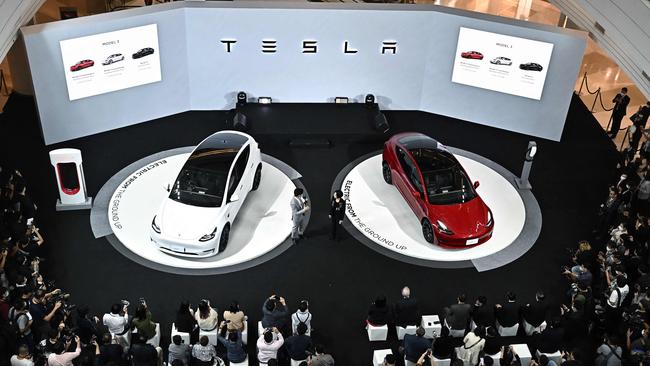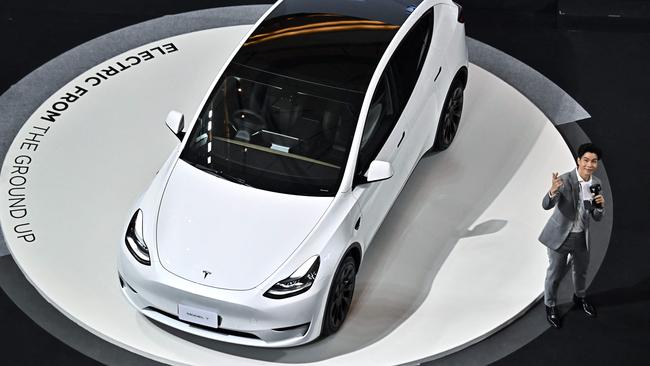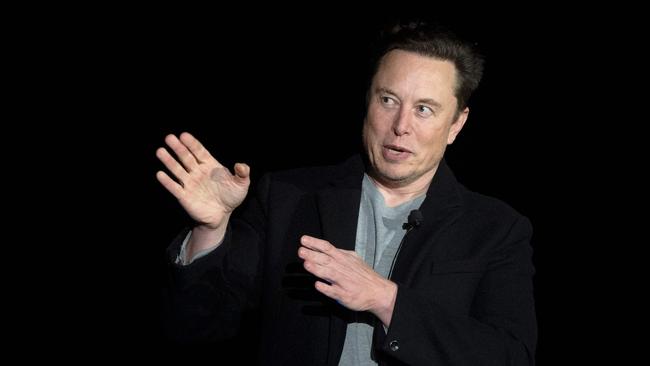Tesla bears are sitting on $US15 billion in gains this year
Reversal of fortunes for Elon Musk’s company has been music to the ears of the stock’s many detractors.

Tesla bears are finally feeling somewhat vindicated.
After years of wrong-way bets, investors shorting the shares of Elon Musk’s electric-vehicle maker are sitting on collective gains of $US15bn in 2022, according to data from S3 Partners.
Short sellers borrow shares and sell them with the hope of profiting by buying the stock back at a lower price later.
Tesla shares have fallen 61 per cent in 2022, including Tuesday’s 8.1 per cent drop, dinged by the higher interest-rate environment that has sent speculative stocks tumbling back to earth. Investors have also grown increasingly concerned that Mr Musk’s attention is divided following his takeover of Twitter.
The reversal of Tesla’s fortunes has been music to the ears of the stock’s many detractors who watched in astonishment when it kicked off a monster run in early 2020, with little regard for fundamentals.
Tesla traded around $US30, on a split-adjusted basis, at the start of that year and eventually peaked above $US400 in November 2021. Its valuation swelled to more than $US1.2 trillion, making it one of the largest companies in the US by market value. The stock closed on Wednesday at $US137.57, a two-year low.

“It has not been an easy road being a Tesla bear,” said Andrew Left, the founder of Citron Research who is known for betting against stocks. “It’s been a pain-in-the-ass trade.”
Of course, many Tesla bears didn’t stick around. Some were forced to call off their bets and close their positions at a loss during the precipitous rise in the company’s shares. Collective mark-to-market losses on the trade were a whopping $US51bn over the course of 2020 and 2021, according to S3.
Tesla has long been among the most-shorted US stocks. The rapid increase in the shares during the pandemic was exacerbated in part by many short sellers who were forced to buy back shares to close losing positions.
Short interest in Tesla peaked at more than $US51bn in January 2021, but has fallen to average $US19.3bn in 2022, according to S3. Roughly 3 per cent of the stock’s free float is currently sold short, down from an average of 10 per cent in 2020.
Mr Left, who was previously burned by his short position, says he promised himself at one point that he would never trade Tesla again. During the US summer, though, he began to get “FOMO” or a fear of missing out, and he jumped back in. Mr Left said he closed his position at a profit but sees room for the shares to fall further.
“It’s still an expensive stock,” he said. “By no means is this over. As most stock traders will tell you, things don’t go from expensive to fairly priced. Things normally go from expensive to cheap.”
Tesla shares are trading at 42.5 times their earnings over the past 12 months, a far cry from their peak multiple of 1765 from January 2021, according to FactSet. The S&P 500, in contrast, trades at 17.6 times earnings.
“People are starting to pay attention to some of the facts that they didn’t want to pay attention to before. Competition. Saturation. There’s a lot of factors involved that people were sweeping under the table,” Mr Left added.
Also hurting the stock of late are Mr Musk’s own share sales. The Tesla chief executive has sold more than $US39bn in stock since November 2021, in part to help finance his Twitter acquisition. His most recent sale was last week.
Mr Musk tweeted late Tuesday that he would step down as Twitter’s chief executive as soon as he finds a replacement.
Mr Musk has previously tweeted that short sellers were “value destroyers” and that short sales should be illegal.

Danny Moses, the investor famous for bets against the housing market who was portrayed in the 2015 movie The Big Short, said on CNBC that he was short Tesla and expected it to fall further.
“It’s still a $US500bn company and I don’t think that the fundamentals justify that valuation,” Mr Moses said. “A lot of the stock price has been about his brand, and we’ve seen that now get hit a little bit. His attention span is being compromised.”
Retail investors refused to abandon Tesla despite this year’s sharp share price declines. Tesla has been the most-purchased stock among US retail investors this year – dethroning Apple, according to Vanda Research. “While purchasing across the market has softened, retail investors have continued to religiously buy into Tesla,” said Lucas Mantle, at Vanda Research.
If there’s one thing strategists agree on, it’s the difficulty of valuing Tesla given the retail interest and Mr Musk’s cult-like following.
Australian hedge-fund manager John Hempton, founder of Bronte Capital, said his firm has a small short position in Tesla but struggles to apply its traditional criteria in evaluating the stock.
“Elon breaks our model,” Mr Hempton said.
The Wall Street Journal






To join the conversation, please log in. Don't have an account? Register
Join the conversation, you are commenting as Logout